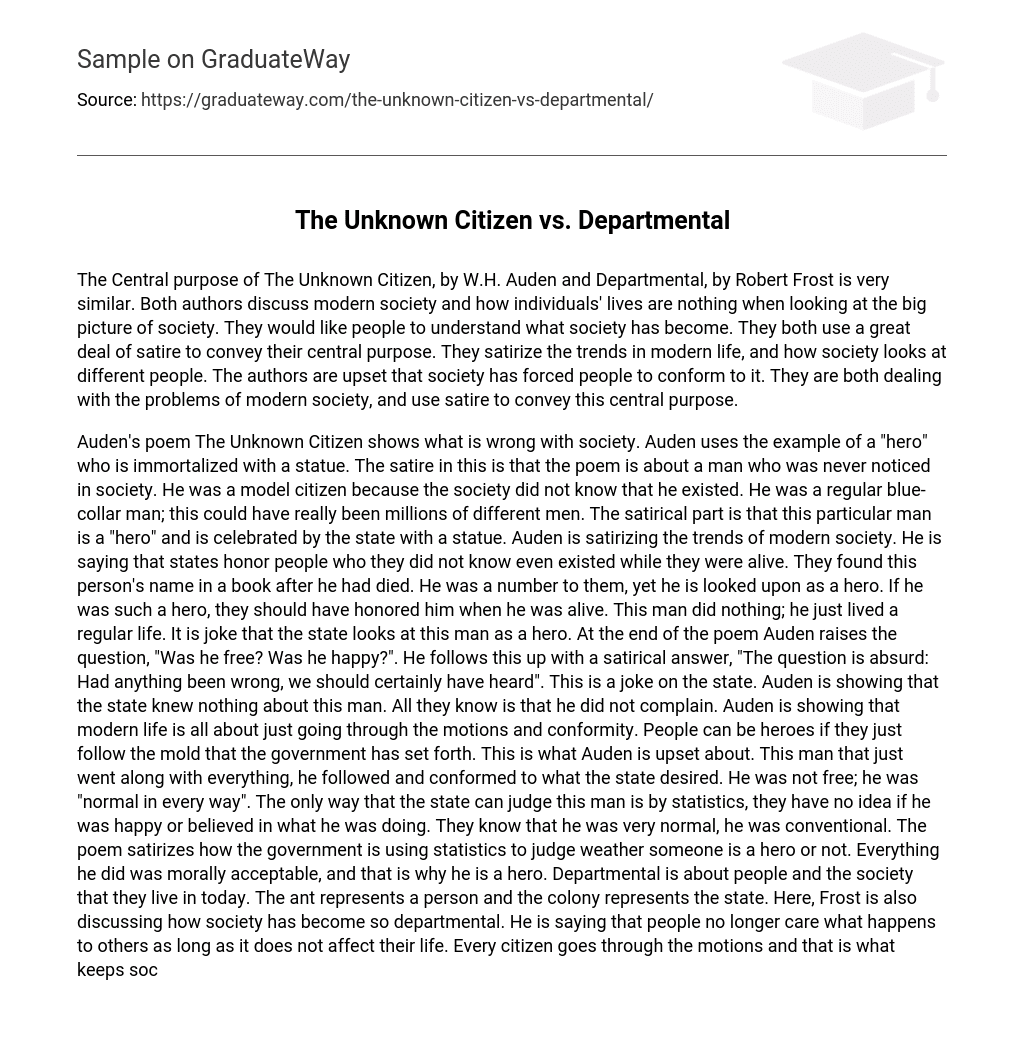The Central purpose of The Unknown Citizen, by W.H. Auden and Departmental, by Robert Frost is very similar. Both authors discuss modern society and how individuals’ lives are nothing when looking at the big picture of society.
They would like people to understand what society has become. They both use a great deal of satire to convey their central purpose. They satirize the trends in modern life, and how society looks at different people. The authors are upset that society has forced people to conform to it.
They are both dealing with the problems of modern society, and use satire to convey this central purpose. Auden’s poem The Unknown Citizen shows what is wrong with society. Auden uses the example of a “hero” who is immortalized with a statue. The satire in this is that the poem is about a man who was never noticed in society.
He was a model citizen because the society did not know that he existed. He was a regular blue-collar man; this could have really been millions of different men. The satirical part is that this particular man is a “hero” and is celebrated by the state with a statue. Auden is satirizing the trends of modern society. He is saying that states honor people who they did not know even existed while they were alive.
They found this person’s name in a book after he had died. He was a number to them, yet he is looked upon as a hero. If he was such a hero, they should have honored him when he was alive. This man did nothing; he just lived a regular life.
It is joke that the state looks at this man as a hero. At the end of the poem Auden raises the question, “Was he free? Was he happy?”. He follows this up with a satirical answer, “The question is absurd: Had anything been wrong, we should certainly have heard”. This is a joke on the state.
Auden is showing that the state knew nothing about this man. All they know is that he did not complain. Auden is showing that modern life is all about just going through the motions and conformity. People can be heroes if they just follow the mold that the government has set forth. This is what Auden is upset about.
This man that just went along with everything, he followed and conformed to what the state desired. He was not free; he was “normal in every way”. The only way that the state can judge this man is by statistics, they have no idea if he was happy or believed in what he was doing. They know that he was very normal, he was conventional. The poem satirizes how the government is using statistics to judge weather someone is a hero or not.
Everything he did was morally acceptable, and that is why he is a hero. Departmental is about people and the society that they live in today. The ant represents a person and the colony represents the state. Here, Frost is also discussing how society has become so departmental.
He is saying that people no longer care what happens to others as long as it does not affect their life. Every citizen goes through the motions and that is what keeps society moving. Frost is making a satire of this, saying that the government just looks at people as a number; they do not look at people as individuals. He is upset about this because no one really cares about who anyone is.
They just want to do their job, and as long as they can do that then everything is perfect. Frost is saying that people do not look twice at what is not their business. When someone dies, people do not care who it was or what he did. Frost says, “No one stands round to stare.
It is nobody else’s affair”. Frost is really upset about this, people should care what is going on with others around them, when someone dies, people should notice, they should look at what this person accomplished and who he was. In Departmental, the ant is confronted with the moth that is many times his sizes. The ant merely walks around this giant and does not even stop to notice it.
He is saying that people should not just do their own thing but look at the big picture and at the people around them. Frost and Auden are both uses satire as a literary feature to convey their central purpose. They want to show people what society has become. They have a similar central purpose. Both speakers are upset that society has turned into a place where everyone conforms and there is no more originality.
They are both satirizing the state. They are both saying that people need to stop and look at what is going on in the world around them. They need to stop and smell the roses every once and a while. Both poems have dramatic irony. They are both dealing with much more than what is simply said.
They have a very similar content. They are both dealing with how people become conformed to the state. They use a satirical style to convey a similar central purpose.





